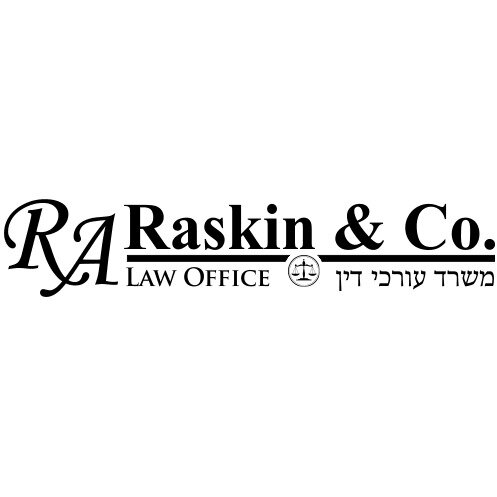Best Art & Cultural Property Law Lawyers in Israel
Share your needs with us, get contacted by law firms.
Free. Takes 2 min.
Or refine your search by selecting a city:
List of the best lawyers in Israel
About Art & Cultural Property Law in Israel
Art & Cultural Property Law in Israel deals with the protection, regulation, and management of cultural property, which includes artworks, historical artifacts, archaeological finds, and other culturally significant items. Given Israel's rich historical and cultural heritage, these laws are particularly important. The legal framework in Israel aims to balance the protection of cultural heritage with the rights of private collectors and buyers. Various statutes, international agreements, and government agencies are involved in enforcing and overseeing these laws.
Why You May Need a Lawyer
There are various situations where individuals, museums, artists, and collectors may require legal assistance in the field of Art & Cultural Property Law. Some common scenarios include:
- Buying or selling art: Legal guidance is essential to ensure compliance with all relevant laws and to verify provenance.
- Inheritance and estate planning: Proper documentation and understanding of the legal implications are crucial for art collections.
- Repatriation claims: Legal support may be necessary when dealing with claims for the return of cultural property.
- Museum loans and exhibitions: Contracts and legal agreements are needed for the temporary transfer and exhibition of artworks.
- Dispute resolution: Legal counsel can help resolve disputes involving ownership or authenticity of artworks.
Local Laws Overview
Several key legal frameworks in Israel are relevant to Art & Cultural Property Law:
- The Antiquities Law (1978): This law governs the excavation and conservation of archaeological artifacts and imposes restrictions on their trade and export.
- The Copyright Law (2007): Artwork protection is further enhanced by copyright laws, providing legal shields for artists' rights and intellectual property.
- Cultural Assets Law (2007): Regulates the protection of significant cultural assets beyond ancient artifacts, including modern art and heritage items.
- International Agreements: Israel is a signatory to several international conventions, such as the UNESCO Convention on the Means of Prohibiting and Preventing the Illicit Import, Export, and Transfer of Ownership of Cultural Property (1970).
Frequently Asked Questions
What qualifies as cultural property under Israeli law?
Under Israeli law, cultural property includes ancient artifacts, archaeological finds, religious objects, and certain artworks that are significant to cultural heritage. The definition often aligns with international conventions, such as those outlined by UNESCO.
Can I export antiquities from Israel?
Generally, the export of antiquities from Israel is heavily restricted, requiring special permits and adherence to strict regulations in accordance with the Antiquities Law. Unauthorized export is illegal and subject to penalties.
How does Israeli law protect artists' rights?
Israeli Copyright Law protects artists' rights by ensuring they maintain control over the reproduction and distribution of their work. Additionally, moral rights protect the artist's reputation associated with their work.
What is the process for loaning art to museums in Israel?
Museum loans generally involve drafting agreements outlining the terms, conditions, and responsibilities of both the lender and the borrowing institution. These agreements require careful legal consideration to ensure the safeguarding of the art.
Can heirs to a private collection challenge the ownership of cultural property?
Yes, heirs have the right to challenge ownership, especially in cases where provenance is disputed or illegal acquisition is suspected. Legal assistance is often necessary to navigate such claims.
Are there tax benefits related to art donations in Israel?
In some cases, donors of art may receive tax benefits, especially when donating to public museums or cultural institutions. It's advisable to consult with a tax expert to understand any applicable benefits.
What steps should I take if I believe an artifact has been illicitly acquired?
If you suspect an artifact has been acquired illegally, it's important to report it to the Israel Antiquities Authority and seek legal advice to address the situation properly.
How are disputes over art authenticity handled?
Disputes over authenticity are typically resolved through expert assessments, negotiations, and, if necessary, legal proceedings, where a lawyer can represent your interests effectively.
Does Israeli law recognize foreign court rulings on cultural property?
International rulings may be recognized, but enforcement in Israel will generally require compliance with local legal standards and procedures.
What legal protection exists for contemporary art in Israel?
Contemporary art is protected under the Copyright Law, which ensures that artists' moral and economic rights are preserved, covering rights of attribution and integrity, as well as limitations on unauthorized reproduction.
Additional Resources
For further information and assistance, consider reaching out to the following resources:
- Israel Antiquities Authority: Responsible for the preservation and protection of archaeological resources.
- Cultural Ministry of Israel: Provides information and support on cultural policies and initiatives.
- Israel Museum: Offers a range of programs and resources related to art and cultural heritage.
- UNESCO: Provides resources on international conventions regarding cultural property.
Next Steps
If you are seeking legal assistance in Art & Cultural Property Law, consider the following steps:
- Identify your specific needs: Clearly define the legal issue you're facing to ensure you find appropriate expertise.
- Consult a specialized lawyer: Look for legal professionals with experience in Art & Cultural Property Law in Israel.
- Prepare necessary documents: Gather all pertinent documentation related to your issue, such as provenance records, contracts, or correspondence.
- Schedule a legal consultation: Arrange a meeting with a lawyer to discuss your case and explore potential strategies and solutions.
Taking these steps can help you effectively address your legal concerns in the realm of Art & Cultural Property Law in Israel.
Lawzana helps you find the best lawyers and law firms in Israel through a curated and pre-screened list of qualified legal professionals. Our platform offers rankings and detailed profiles of attorneys and law firms, allowing you to compare based on practice areas, including Art & Cultural Property Law, experience, and client feedback.
Each profile includes a description of the firm's areas of practice, client reviews, team members and partners, year of establishment, spoken languages, office locations, contact information, social media presence, and any published articles or resources. Most firms on our platform speak English and are experienced in both local and international legal matters.
Get a quote from top-rated law firms in Israel — quickly, securely, and without unnecessary hassle.
Disclaimer:
The information provided on this page is for general informational purposes only and does not constitute legal advice. While we strive to ensure the accuracy and relevance of the content, legal information may change over time, and interpretations of the law can vary. You should always consult with a qualified legal professional for advice specific to your situation.
We disclaim all liability for actions taken or not taken based on the content of this page. If you believe any information is incorrect or outdated, please contact us, and we will review and update it where appropriate.
Browse art & cultural property law law firms by city in Israel
Refine your search by selecting a city.
















